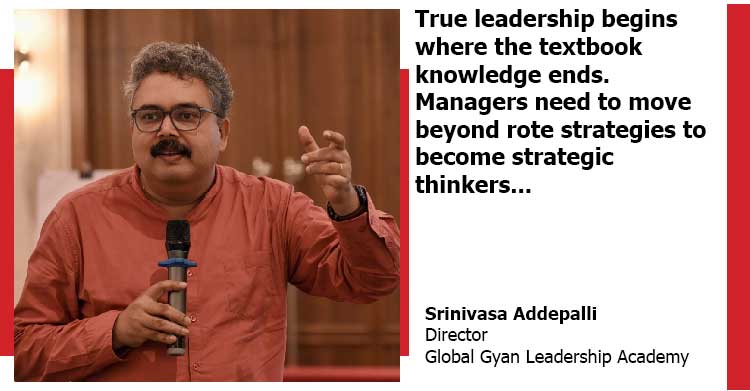Learning to Lead in Chaos: What India’s Future Managers Really Need to Be Taught | Srinivasa Addepalli | Director | Global Gyan Leadership Academy

A few years ago, I stood in front of a room full of young management students, excited and anxious about their future careers. I asked them, “How many of you are here because of the placements this college promises?” Nearly every hand went up. When I asked, “How many of you came here because you want to learn how to solve complex, messy problems that the world throws at us?” I saw fewer hands. But I also saw curiosity.
That curiosity is where our hope lies.
We are living in a time when chaos is not the exception. It is the norm. From global pandemics to climate crises, from digital disruption to geopolitical volatility, today’s managers are not entering stable environments. They are stepping into storms.
Yet, business education in India even today, largely prepares students for a world of certainty. We teach tried and tested frameworks, run simulations, and deliver case studies with well-defined endings. What we do not do enough is help our students develop the confidence to navigate ambiguity. We train them to analyse, but not to anticipate. We prepare them for predictable performance, but not for perspective.
The Real Curriculum of Leadership
As Michael Porter emphasized, strategy is about creating a unique and valuable position, making deliberate choices, and ensuring that all activities align with these choices. But chaos demands even more.
In chaos, leaders must ask: what matters most now? What will matter tomorrow? And how can we align our people and resources to adapt faster than the problem evolves?
India’s future managers must be taught:
1. Thinking Ahead: Decisions are often made based on past data. But leaders must be comfortable with incomplete information. They need to train their intuition, interpret weak signals, and develop scenarios. Our students must be exposed to megatrends shaping our world, such as climate change, AI, and dynamic demographic shifts, not just as abstract ideas but as forces that will impact every industry and job.
2. Making Choices and Trade-offs: In the comfort of classrooms, it’s easy to pick the right answer. But leadership is about choosing between two wrong answers. Should I reduce cost or invest in innovation? Should I lay off people or risk bankruptcy? These are painful decisions. Teaching students how to handle ethical dilemmas, resource constraints, and conflicting stakeholder interests is essential.
3. Embracing Execution as Strategy: One of the most misunderstood ideas is that strategy comes first and execution follows. In reality, strategy is not just a plan; it is how you act. Indigo Airlines did not succeed just because they wanted to be on time. They chose aircraft, routes, and processes to ensure punctuality. The same must be taught to our managers. The idea must be backed by capability.
The Missing Leadership Competencies
Traditional leadership models are typically boxed into Leading Self, Leading Others, and Leading Business. But future readiness comes from integrating these dimensions. We must cultivate:
Learning Agility: The world will not wait for your MBA to be completed. What you learn over a 2-year degree today may become irrelevant in 6 months. Future leaders must be self-driven learners who can acquire and apply new knowledge, quickly.
Digital Thinking: It is not enough to know technology exists. Managers must understand how technology redefines customer value, disrupts industries, and changes the rules of engagement.
Decision Making Under Uncertainty: Most managers wait for complete data to make decisions. But leadership is often about choosing the best possible option with the least information. Scenario thinking, risk management, and comfort with ambiguity must be core to our pedagogy.
Influencing Without Authority: Managers today work in flatter, well-networked organizations. Getting things done requires the ability to build trust, communicate purpose, and align diverse teams.
Partnering for Impact: No one builds alone anymore. Whether you are in a start-up or a conglomerate, your success depends on strategic alliances. Teaching collaboration, negotiation, and ecosystem thinking is vital.
And equally, we need to reinforce to developing managers the foundational traits of leadership: humility, curiosity, and empathy.
Teaching in a New Way
To equip managers for chaos, our teaching methods must evolve. We need less focus on perfect solutions and more emphasis on inquiry and experimentation. We must let students fail in safe environments, learn from diverse perspectives, and engage with real-world problems. I’ve always held the belief that leadership is not taught in PowerPoint decks alone. It is discovered through reflection, conversation, and continuous practice. We need to create spaces where future leaders can explore their purpose, question assumptions, and build resilience.
Putting it All Together
Demographic advantage, entrepreneurial energy, and digital capability give India a unique opportunity to lead in the 21 st century. But this can only happen if we reimagine what it means to keep learning as we keep leading. Our future managers do not just need a toolkit. They need a mindset. They must be prepared not to avoid chaos but to engage with it, to make meaning out of uncertainty, and to guide others through turbulence with courage and clarity.
Let us not prepare our future managers for the world that was. Let us prepare them for the world that is becoming. Because leadership in chaos is not about having all the answers. It is about asking the right questions, at the right time, with the right people. And having the heart to lead when the path is not yet clear.


